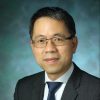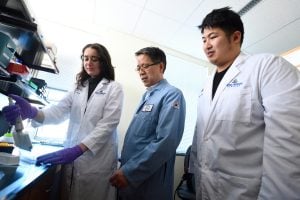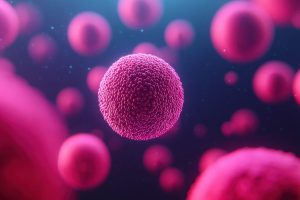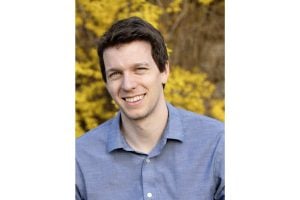Hai-Quan Mao, director of the Institute of NanoBioTechnology (INBT) and a professor of materials science and engineering, is known for his work engineering novel nanomaterials for regenerative medicine and therapy delivery applications. He holds a joint appointment in the Translational Tissue Engineering Center and the Department of Biomedical Engineering at the School of Medicine.
In the regenerative engineering area, Mao has developed nanofiber scaffolds from synthetic and natural biomaterials for liver tissue engineering, stem cell expansion and differentiation, and soft tissue regeneration. He also discovered a synergistic effect between nanofiber topography and biochemical cues on the proliferation of human hematopoietic stem and progenitor cells (HSCs); invented a more efficient HSC expansion method that can enable various HSC-based cellular therapies; engineered different methods for promoting lineage-specific differentiation of neural (crest) stem cells; and developed tailored, nanofiber-based scaffolds for vascular engineering, skeletal muscle regeneration, spinal cord repair, and peripheral nerve regeneration.
Mao’s contributions in therapeutic engineering include understanding the assembly mechanism of nanoparticles from the polyelectrolyte complex of plasmid DNA, RNA, or protein therapeutics with charged polymer-carriers, engineering DNA nanoparticles with tunable shape and uniformity that mimic natural viral particles, the development of scalable production methods for these therapeutic nanoparticles, and their applications in local and systemic delivery of macromolecular therapeutics and vaccines.
Mao has been elected a Fellow of the National Academy of Inventors, the American Institute for Medical and Biological Engineering, and the Royal Society of Chemistry. He holds 35 issued U.S. patents, six international patents, and more than 60 provisional U.S. patent applications. He is co-founder of LifeSprout Inc. and SpaceTime Therapeutics, LLC. Mao was the recipient of the Young Investigator Award at the National University of Singapore in 2002 and the National Science Foundation Faculty CAREER Award in 2008. He also won the Johns Hopkins University’s Cohen Translational Engineering Award in 2015 and 2021, the Louis B. Thalheimer Award for Translational Research in 2016 and 2020, and the Johns Hopkins Discovery Award in 2016, 2018, 2019, and 2022.
Mao serves as associate editor of the journal Biomaterials and is an editorial board member for ACS Biomaterials Science & Engineering and Journal of Materials Chemistry B. He is a member of several professional societies including the Society for Biomaterials, the American Society for Gene and Cell Therapy, and the Tissue Engineering and Regenerative Medicine International Society.
He received his BS degree in chemistry and a PhD in polymer chemistry from Wuhan University in China in 1988 and 1993, respectively. From 1995 to 1998, he pursued his postdoctoral training in the Department of Biomedical Engineering at the Johns Hopkins University School of Medicine. He was a co-principal investigator at Johns Hopkins in Singapore from 1999 to 2003, prior to joining the faculty of Whiting School of Engineering.



